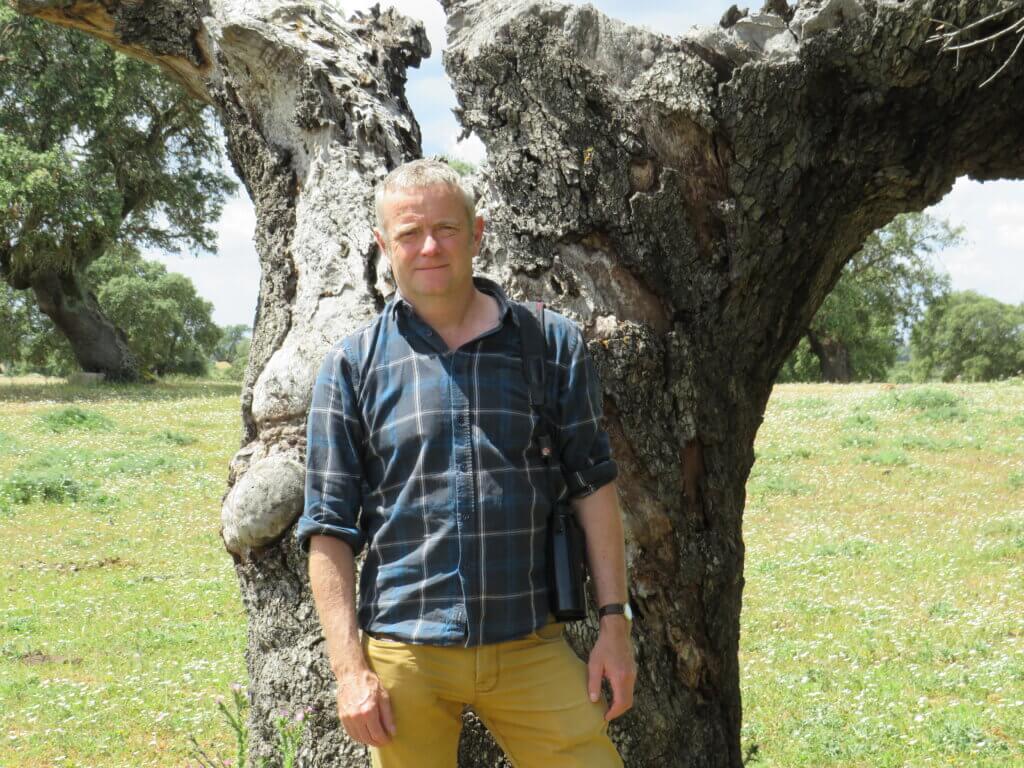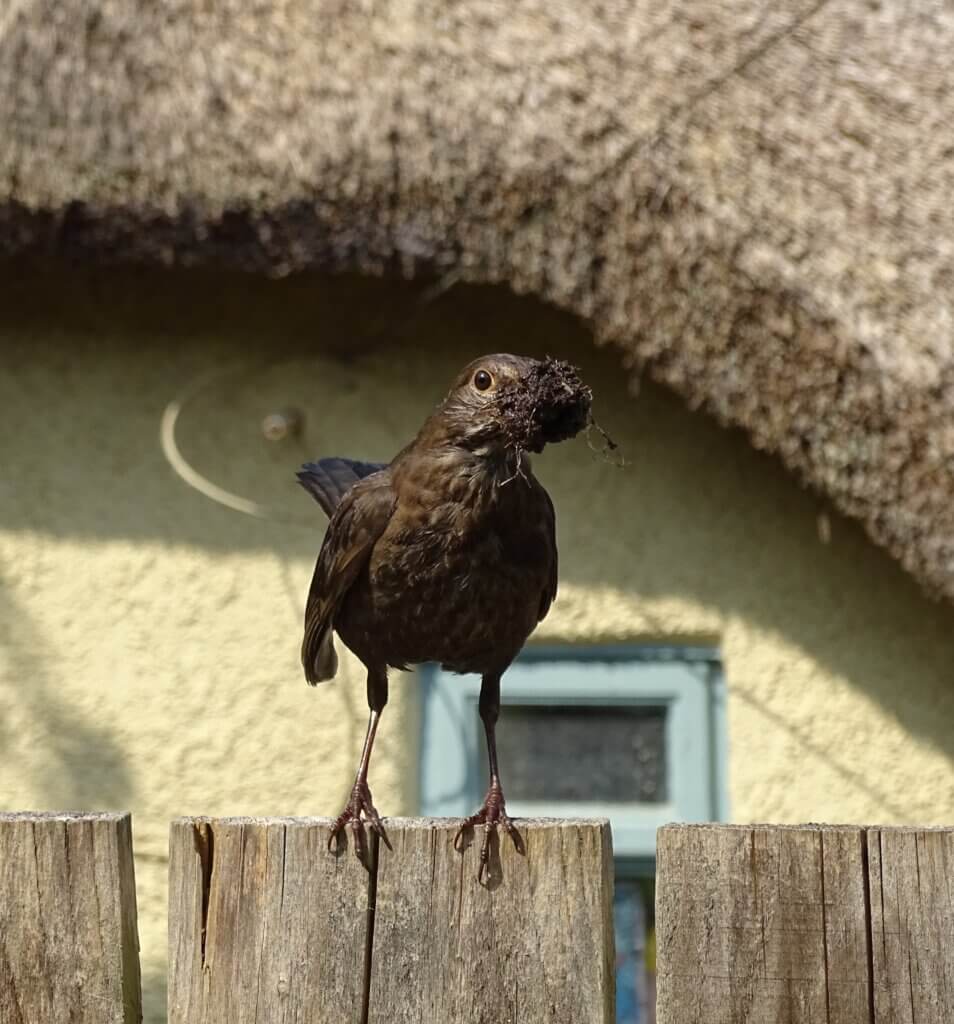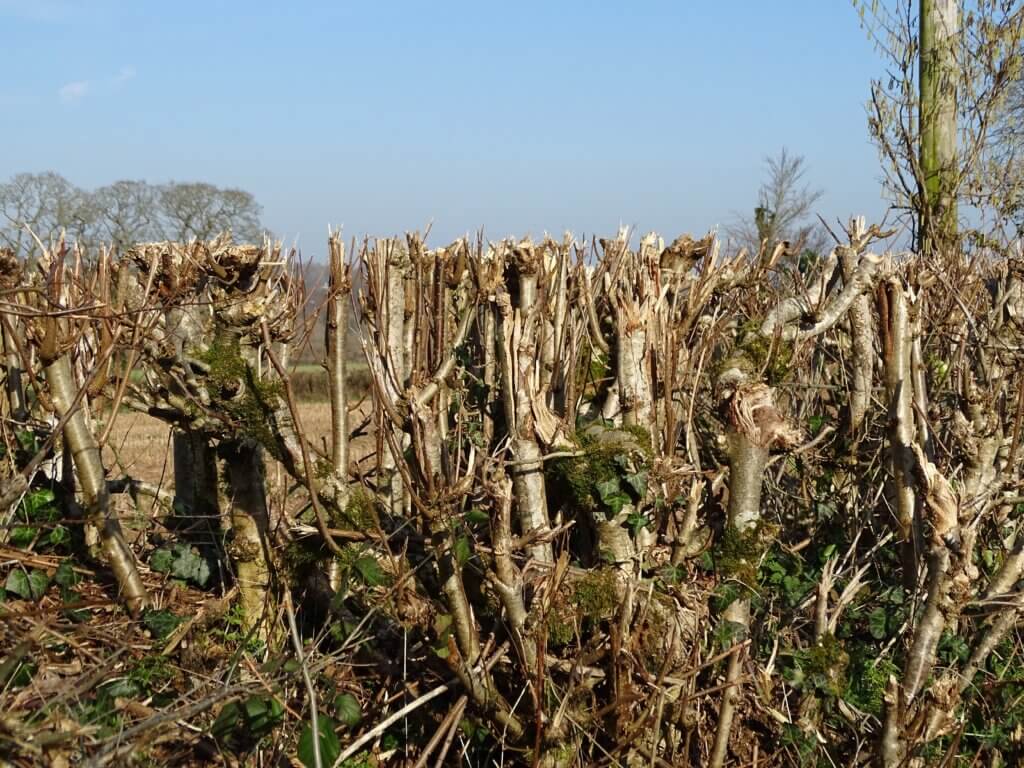 Ian Parsons spent twenty years as a ranger. He now writes books and articles on wildlife. He has contributed many articles to this blog.
Ian Parsons spent twenty years as a ranger. He now writes books and articles on wildlife. He has contributed many articles to this blog.
His book A Vulture Landscape was published by Whittles Publishing in 2020, this was followed by Seasonality in 2022. His new book, Of the Trees and the Birds is now available for pre order direct from the publishers https://www.whittlespublishing.com/Of_the_Trees_and_the_Birds or via the many book selling websites. Ian is also the editor of the forthcoming book Great Misconceptions – Rewilding Myths and Misunderstandings.
You can follow Ian on Twitter @Birder_Griffon
On Monday the 13th February, as I stared out the bedroom window at the somewhat soggy garden outside, I was captivated by the repetitive actions of three species of bird, namely Blackbird, Robin and Wren. They were constantly visiting different parts of the garden, the Blackbird going to the hanging baskets sat on the patio, the Robin to an area of the garden where leaves had accumulated over the winter and the Wren to the mossy stone edges around one of the ponds.

Three different birds, three different areas of the garden, one single objective: gathering nest material. All three species of bird were busily engaged in building their nests, the nesting season, on the 13th February 2024, was evidently already well underway. I live in Devon, in the south west of England, a place where spring begins earlier than in other parts of the country, but I don’t live in a nestled nook, I live in a relatively high up village just to the north of Dartmoor, it is not a sheltered location with its own warmer microclimate, we get frosts when many other parts of Devon do not, if birds are nesting in my garden in February, they will be doing so across a far bigger area of the country too.
Our climate is warming, there is plenty of long term scientific evidence telling us this, as a result, other things are changing too, one of the more noticeable for garden watchers such as myself is that signs of spring are getting earlier, flowers are flowering earlier, leaves are bursting bud earlier and birds are nesting earlier. Studies have shown this, with the Wildlife Trusts’ Nature Calendar a great example of how times are a changing.
But not everything is changing.
Six days after I watched the nest building activities of the birds, I found myself watching the hedge flailing activities of a local farmer on the edge of the village, mechanically smashing the hedgerow, leaving shattered remnants scattered everywhere and torn stems forlornly standing. I’m not a fan of how we manage hedgerows in this country, I think it is appalling to be honest, but whatever my personal views are on the subject, the farmer was carrying out a perfectly legal activity.

Most people believe that it is illegal to cut a hedgerow from the 1st March through to 31st of July because of nesting birds, but it is not quite as clear cut as this and legislation covering the cutting of hedgerows is currently a bit of a fudge. It was covered by the Hedgerow Regulations Act which made it a condition of the agri-environment payment scheme that hedgerows couldn’t be cut during this period to protect nesting birds. This was then further enhanced by other subsidies that paid farmers not to cut hedgerows during the period from the 1st March through to the 31st of August.
But, in another Brexit bonus, those regulations lapsed at the beginning of this year as we finally withdrew from the EU’s Common Agricultural Policy, our government has so far failed to replace the regulations, despite saying that they would and consulting on them last summer. All wild birds and their nests are protected by law in this country under the Wildlife and Countryside Act 1981, which makes it an offence for any person to intentionally damage, destroy or take the nest of any wild bird while it is in use or being built. But the act has no provision for a ‘close season’ on hedgerow cutting, there are no dates mentioned in the act in relation to nesting wild birds.
The key word in the legislation is ‘intentionally’, as it immediately creates the defence of “I didn’t mean to do it!”, if that word was replaced by recklessly (as it is for rarer species listed on Schedule 1 of the Act) then the legislation would be far stronger. So, currently there is no legislation or regulations stating that hedgerows cannot be cut between the 1st of March and the 31st July despite the fact that the majority of people think there is. The only protection for wild bird nests is that quoted above and that is so weak, that any prosecution under it relating to hedgerow cutting is extremely unlikely.
I am pretty confident that when the government do replace the EU based Hedgerow Regulations they will pretty much cut and paste them and that the regulations governing hedgerow cutting will use the same dates as before.
But, in my opinion, those dates are anachronistic relics of a time now gone. The climate isn’t just changing, it has changed, nature is adapting to this change as nature does, surely therefore any new laws and regulations that protect that nature need to adapt and change too.
Blackbirds, Wrens and Robins all nest in hedgerows, my garden is not some strange oasis with a sub-tropical climate, the birds don’t act differently within it, February nest building is not an anomaly, it is what is happening now and what will be happening in the future, if new hedgerow legislation and regulation is put in place to protect wild birds then it must adapt to the new reality, otherwise it is going to fail in what it sets out to do.
But, luckily, our government is on the case. Published in 2023, the government’s National Adaption Programme (NAP 3), a five year plan on how we need to adapt to climate change, states very clearly:
“Climate adaptation is a priority and is being built into all farming and countryside programme policy design.”
Presumably that means an imminent change to the dates likely to be used in any forthcoming hedgerow regulations! Hooray!
And the farmers themselves? Well, the National Farmers Union (NFU) seem to support such a change, their Environment Forum Chair, under a headline of “Prioritising climate adaptation and resilience in UK agriculture” emphasised “the integral connection between farming and the environment. Sustainable agriculture is closely tied to biodiversity and soil health. Farmers play a crucial role in improving the environment by adopting practices that enhance biodiversity and ecosystems.” One again presumes, but adapting and adopting hedgerow cutting regimes to protect wild birds seems to fit absolutely perfectly into that statement.
That’s all good then.
I may be cynical, well actually I am cynical, but I don’t think that anything is going to change in terms of dates when it comes to hedgerow cutting. All this talk of adaptation isn’t about protecting birds building their nests in hedgerows in February, that will, in my opinion, be quietly ignored by whatever ‘new’ regulations the government bring in. But that doesn’t mean that we and the various wildlife NGOs have to ignore it. We know that some species of bird are nesting earlier in the year, and that some of these species nest regularly in hedgerows, we need to make sure that this isn’t ignored and that future protection of nesting birds in our changing climate is built into future legislation and regulations governing hedgerow cutting, they need to reflect reality and not just follow outdated dates.
How we do this is the challenge, building datasets that show that birds are nesting earlier is obviously important, but so is holding politicians to account on their words, words such as those laid down by the government in NAP 3: “Climate adaptation is a priority and is being built into all farming and countryside programme policy design.” And whilst they are busy doing that, perhaps in the next quinquennial review of the Wildlife and Countryside Act (which might be 2025 or 2026 depending on the knock on from Covid) we could ask them to make a minor change to the wording, replacing ‘intentionally’ with ‘recklessly’, it’s not even much typing…
[registration_form]